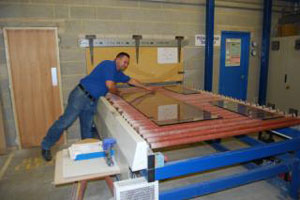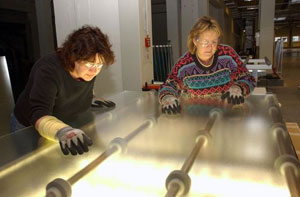Glass Processor
Tasks & duties

Glass processors may do some or all of the following:
-
process the raw edges of the glass (edgework)
-
wash the glass
-
bevel glass edges
-
drill holes and make cut-outs in splashbacks (for power points)
-
cut the glass into specific shapes using hand tools or large machinery
-
cut the glass to specific dimensions on an autoline cutting machine
-
toughen the glass using furnace machinery
-
make double-glazed units
Specialisations
Glass processors may specialise in certain processing techniques such as toughening or furnacing glass. They may also specialise in using certain pieces of machinery and computerised plotting and shaping tools.
Skills & knowledge

Glass processors need to have:
-
knowledge of different types of glass and how to work with them
-
skill in using machinery and hand tools with precision
-
maths skills for calculating dimensions
-
computer skills
-
knowledge of safety procedures and health and safety regulations
-
first aid skills
-
knowledge of lifting techniques to avoid injury
-
good organisational skills
Entry requirements
There are no specific entry requirements to become a glass processor. However, most employers prefer you to do an apprenticeship and complete the National Certificate in Glass Processing. This includes attending block courses and completing workbooks by correspondence. For more information contact the Joinery Industry Training Organisation.
Secondary education
Useful subjects include English, maths, technical drawing and workshop technology.
Training on the job
Skills are gained on the job and it is important for glass processors to keep up to date with new technology and products. Most companies conduct in-house training on new equipment and products. Glass processors may attend short courses to learn how to operate certain pieces of specialist equipment.
Useful experience
Useful experience includes any work in the glass or building construction industries, or in any factories or processing plants.
Related courses
Ceramics, Industrial Glass and Rubber Manufacturing
Glazing
For more information, please refer to Career Services.
Document Actions
